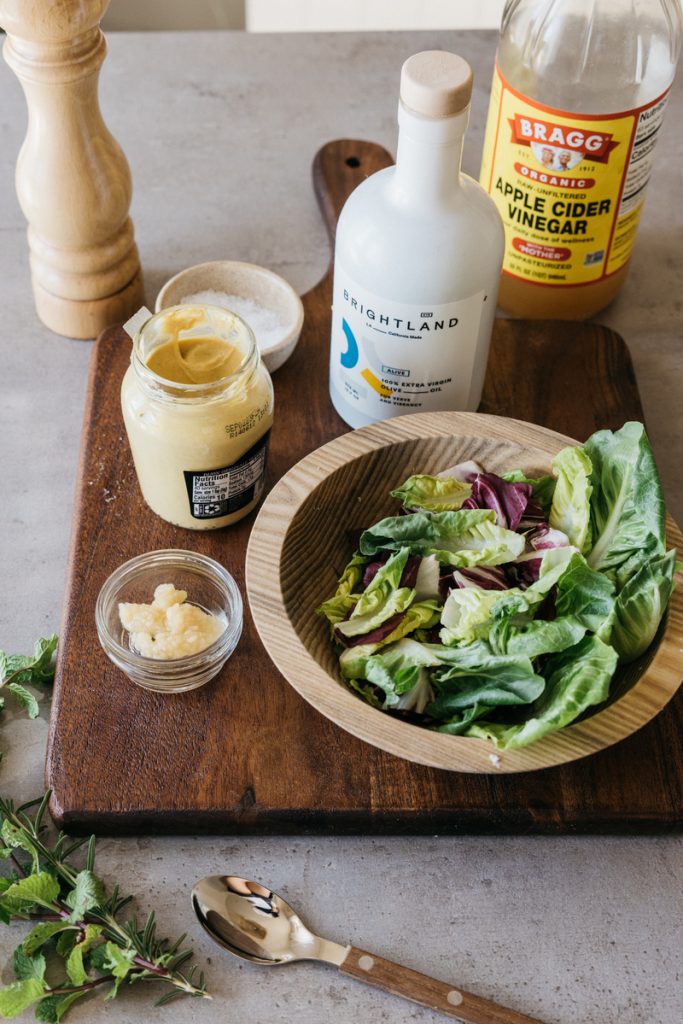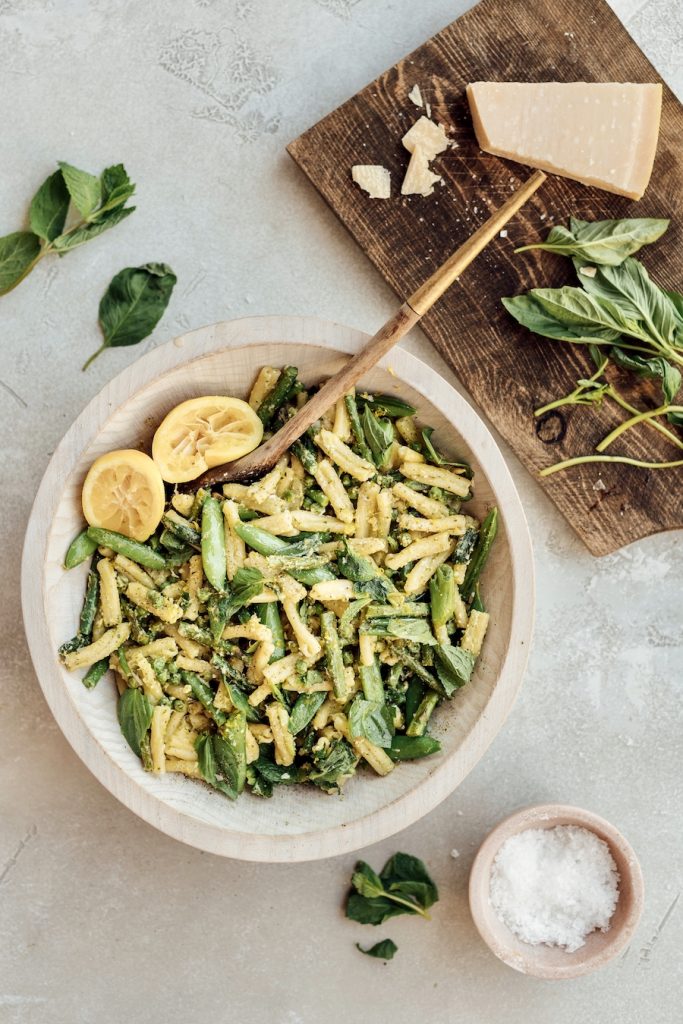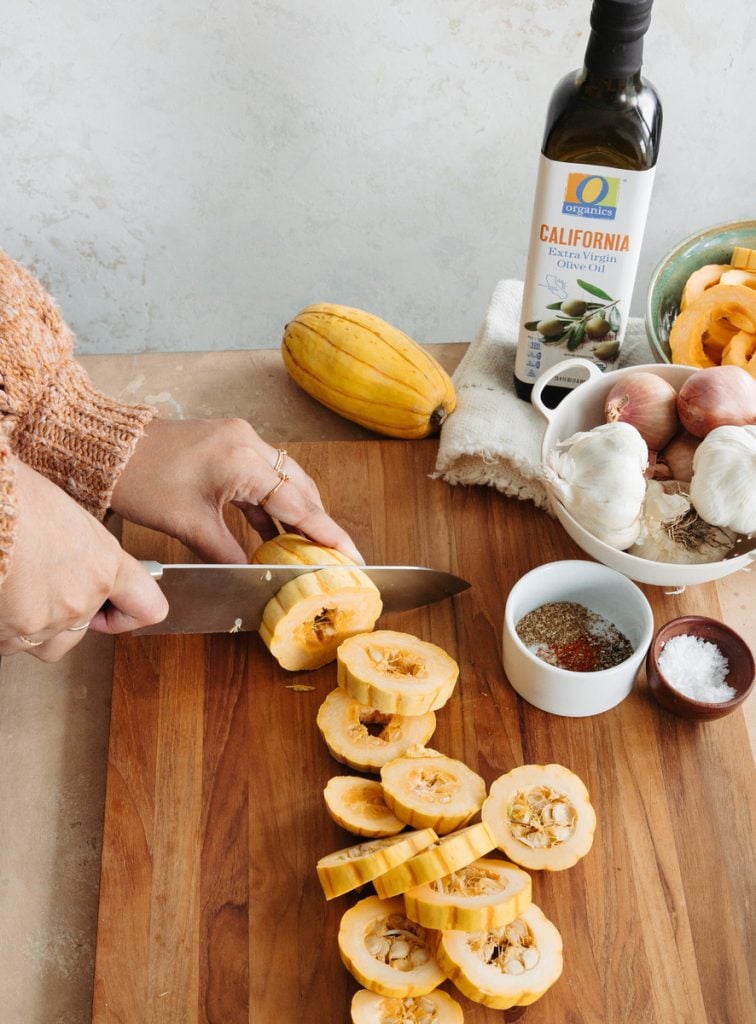This goes without saying, but social media is a slippery slope—especially when it comes to nutrition. Across the internet, there’s no shortage of conflicting info. Start scrolling, and you’re inundated with unsolicited (and oftentimes, unhelpful) health and wellness advice. Given the playing field, even those without proper nutrition training employ a megaphone. And these opinions reach us—daily. One controversy that continues to make waves? Canola oil vs olive oil. Is the former killing us, or are persuasive influencers poisoning the conversation? Let’s uncover the facts.
Featured image by Michelle Nash.



What is canola oil?
Peruse the hot bar at your local grocer, and the prepared foods have likely been sautéed, fried, or dressed in canola oil. Canola oil is everywhere. Restaurants use it as a “vegetable” oil in much of their cooking, but you’ll also find it in bottled salad dressings, granola bars, cooking sprays, and bread. Because it tastes neutral and has a high smoke point, canola oil is a go-to for stir-frying, baking, and deep-frying. Made from plant breeding, canola oil is a genetically modified version of the rapeseed plant. Canada is the world’s top canola oil exporter.
How is canola oil made?
In many ways, turning canola seed into oil is similar to how other industrial seed oils are processed. First, canola seed is thoroughly cleaned. Then, it’s heated and flaked (that way, more oil can be released). After, the seed is passed through rollers to get ruptured. Next up, the flakes go through a series of heating drums or cookers. Last but not least, more chemicals are added to improve its color. Then, canola oil is ready for market.


Pros And Cons Of Canola Oil
Most agree: canola oil is far from a saint. But in small amounts, will it make or break your health? Let’s dig in.
1. Versatile cooking oil
Thanks to its minimal flavor, high smoke point, and smooth texture, canola oil is one of the most versatile cooking oils. As mentioned, you can use it in a number of dishes and cooking methods, like sauces, marinades, nonstick baking, grilling, and more. As a result of how much its refined, canola oil doesn’t affect the final flavor of the dish.
2. Low in saturated fat
One 2011 study concludes that those who eat canola oil may have lower cholesterol levels (than those who consume oils rich in saturated fatty acids). The researchers also suggest that canola oil could be considered heart-healthy. Keep in mind that more recent studies debunk these claims.
3. Most is genetically modified
High-demand crops, like corn and canola, have been genetically engineered to be more resistant to herbicides and pests. Although many food manufacturers deem GMO foods safe, concerns abound over their potential impact on the environment, public health, crop contamination, and more. In other words, while GMO foods are approved for human consumption, little data exists on their long-term safety for human health and the environment.
4. Contributes to inflammation
Canola oil is (very) high in omega-6 polyunsaturated fats (PUFA). While we need some omega-6s in our diet, canola oil contains too much of this nutrient. Unfortunately, a diet high in omega-6 fats can cause systemic inflammation in the body. In turn, this is an underlying factor for essentially all modern chronic diseases, including heart disease and diabetes. The key is to consume more omega-3 fatty acids (found in wild-caught salmon, flaxseed, walnuts, etc.) than omega-6 fatty acids.
5. May worsen memory
Animal studies indicate that canola oil may negatively impact memory. A study in mice found that chronic exposure to a canola-rich diet resulted in significant harm to memory and substantial increases in body weight. In a yearlong human study, adults were randomly assigned to either a diet rich in refined oils—including canola—or a diet which replaced all refined oils with extra-virgin olive oil. Unsurprisingly, those in the olive oil group experienced improved brain function.
Is canola oil dangerous?
This depends on who you ask. According to the FDA, no. However, there is substantial research to prove otherwise. At the end of the day, if you eat a mostly varied, minimally-processed diet, there’s no need to worry about any one food or ingredient. We’ve said this once but we’ll say it again: embodying a fearful attitude toward eating is not the goal. Yes, canola is devoid of nutrients and can raise inflammatory markers in the body, but being overly concerned about every morsel of food that goes into your body is just as (if not more!) detrimental.


What is olive oil?
Before we settle the canola oil vs olive oil debate, let’s unpack canola oil’s antidote: olive oil. Olive oil—also known as liquid gold—comes from pressing whole olives, a traditional crop of the Mediterranean. It’s commonly used in cooking, but you can also find olive oil in cosmetics, pharmaceuticals, soaps, and more.
Proven Health Benefits Of Olive Oil
In comparison to canola oil, olive oil’s benefits are a dime a dozen. Olive oil is the cornerstone of the Mediterranean diet—an essential nutritional mainstay for the world’s longest-living cultures. In fact, it seems to predict higher life expectancy! Extra-virgin olive oil can work as an anti-inflammatory compound, protect against insulin resistance, reduce high blood pressure, and more. Given its lower smoke point, olive oil is best for salad dressings, vinaigrettes, and sauces, like pesto. Just be cognizant of olive oil fraud. Here are some expert tips on how to buy and use olive oil.


Can you eat olive oil every day?
Yes. In fact, studies show that—in addition to a healthy lifestyle and well-rounded diet—those who consume more than 1/2 a tablespoon of olive oil a day are less likely to die from heart disease, cancer, neurodegenerative diseases, like Alzheimer’s or lung disease. Olive oil is rich in healthful antioxidants, polyphenols and vitamins, and is a good source of heart-healthy monounsaturated fats. These properties likely play a role in these findings. Make olive oil a part of your morning routine!


Olive Oil Fraud
While there aren’t any nutritional downsides to olive oil, not all olive oil is created equal. If you didn’t know, olive oil fraud is real. In fact, it’s estimated that 70% of olive oil is actually fake. That’s more than two-thirds of olive oil bottles. Because quality olive oil is expensive to produce, there are many diluted and counterfeit products that claim to be extra-virgin olive oil—but aren’t. Unfortunately, olive oil is one of the most adulterated food products in the world.
How can you spot inferior olive oil?
When produced with quality in mind, olive oil is incredibly rich in depth, nuance, and flavor—similar to wine! How to tell? Taste your olive oil straight from the bottle. Drizzle some on a spoon, smell its aroma, then let the taste linger on your tongue. If it tastes like absolutely nothing (or plastic-y), it’s most likely rancid. Additionally, if it comes in a plastic bottle, this is also a tell-tale sign of low quality. That said, if the oil tastes fresh, green, and has a peppery finish, it’s likely the real deal.


Canola oil vs olive oil: which one is healthier?
Because they have different uses, you may want to stock both canola oil and olive oil in your pantry. In either case, aim to buy organic—especially canola oil. Inevitably, this will cut down on the amount of chemicals (including pesticides) sprayed on canola or olive plants. At any rate, olive oil is superior. It’s heart-healthy, rich in antioxidants, and can support a healthy memory. Although canola oil is more economical and versatile, there are much better oil options. Don’t sweat consuming canola oil in moderation, but when you have the choice, choose olive oil.






